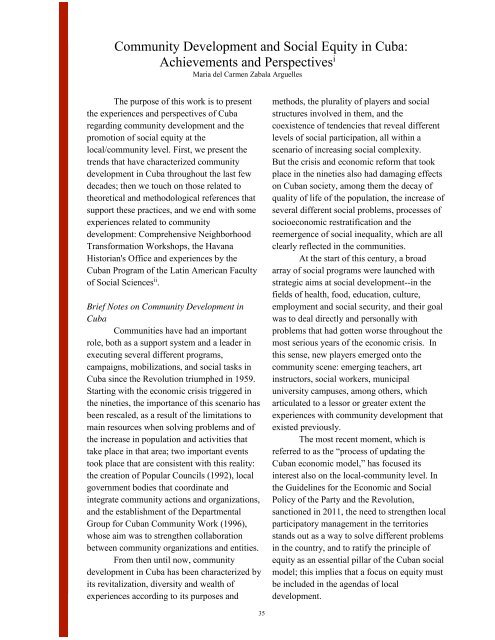CLC-Conference-Proceeding-2018
Create successful ePaper yourself
Turn your PDF publications into a flip-book with our unique Google optimized e-Paper software.
Community Development and Social Equity in Cuba:<br />
Achievements and Perspectives i<br />
Maria del Carmen Zabala Arguelles<br />
The purpose of this work is to present<br />
the experiences and perspectives of Cuba<br />
regarding community development and the<br />
promotion of social equity at the<br />
local/community level. First, we present the<br />
trends that have characterized community<br />
development in Cuba throughout the last few<br />
decades; then we touch on those related to<br />
theoretical and methodological references that<br />
support these practices, and we end with some<br />
experiences related to community<br />
development: Comprehensive Neighborhood<br />
Transformation Workshops, the Havana<br />
Historian's Office and experiences by the<br />
Cuban Program of the Latin American Faculty<br />
of Social Sciences ii .<br />
Brief Notes on Community Development in<br />
Cuba<br />
Communities have had an important<br />
role, both as a support system and a leader in<br />
executing several different programs,<br />
campaigns, mobilizations, and social tasks in<br />
Cuba since the Revolution triumphed in 1959.<br />
Starting with the economic crisis triggered in<br />
the nineties, the importance of this scenario has<br />
been rescaled, as a result of the limitations to<br />
main resources when solving problems and of<br />
the increase in population and activities that<br />
take place in that area; two important events<br />
took place that are consistent with this reality:<br />
the creation of Popular Councils (1992), local<br />
government bodies that coordinate and<br />
integrate community actions and organizations,<br />
and the establishment of the Departmental<br />
Group for Cuban Community Work (1996),<br />
whose aim was to strengthen collaboration<br />
between community organizations and entities.<br />
From then until now, community<br />
development in Cuba has been characterized by<br />
its revitalization, diversity and wealth of<br />
experiences according to its purposes and<br />
methods, the plurality of players and social<br />
structures involved in them, and the<br />
coexistence of tendencies that reveal different<br />
levels of social participation, all within a<br />
scenario of increasing social complexity.<br />
But the crisis and economic reform that took<br />
place in the nineties also had damaging effects<br />
on Cuban society, among them the decay of<br />
quality of life of the population, the increase of<br />
several different social problems, processes of<br />
socioeconomic restratification and the<br />
reemergence of social inequality, which are all<br />
clearly reflected in the communities.<br />
At the start of this century, a broad<br />
array of social programs were launched with<br />
strategic aims at social development--in the<br />
fields of health, food, education, culture,<br />
employment and social security, and their goal<br />
was to deal directly and personally with<br />
problems that had gotten worse throughout the<br />
most serious years of the economic crisis. In<br />
this sense, new players emerged onto the<br />
community scene: emerging teachers, art<br />
instructors, social workers, municipal<br />
university campuses, among others, which<br />
articulated to a lessor or greater extent the<br />
experiences with community development that<br />
existed previously.<br />
The most recent moment, which is<br />
referred to as the “process of updating the<br />
Cuban economic model,” has focused its<br />
interest also on the local-community level. In<br />
the Guidelines for the Economic and Social<br />
Policy of the Party and the Revolution,<br />
sanctioned in 2011, the need to strengthen local<br />
participatory management in the territories<br />
stands out as a way to solve different problems<br />
in the country, and to ratify the principle of<br />
equity as an essential pillar of the Cuban social<br />
model; this implies that a focus on equity must<br />
be included in the agendas of local<br />
development.



